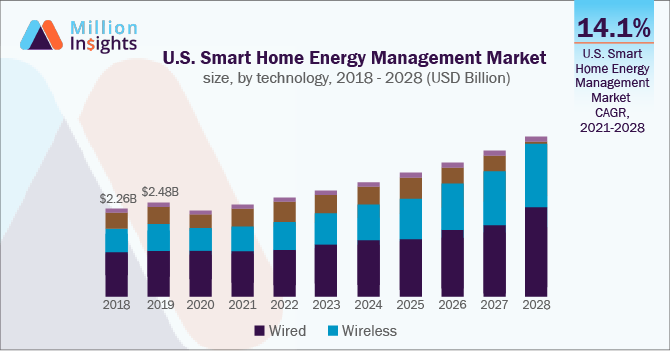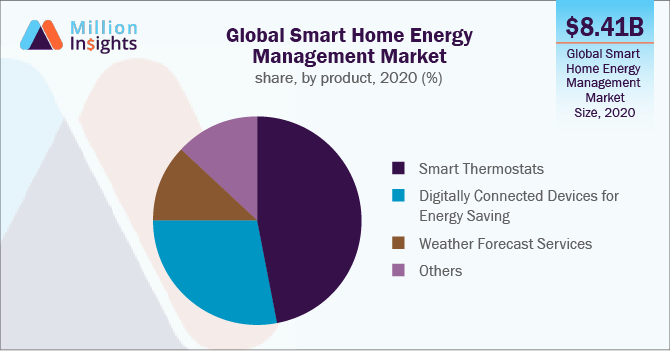The global smart home energy management market size was valued at USD 8.41 billion in 2020 and is expected to expand at a compound annual growth rate (CAGR) of 14.7% from 2021 to 2028. Consumers’ increased inclination to reduce the home electric utility bills by achieving energy efficiency is primarily fueling the market growth. Growing awareness among consumers regarding efficient energy management and technological advancements will further propel the market growth. Smart home energy management devices allow the consumers to measure and monitor the energy consumption and control the home appliances remotely, which helps in achieving efficient energy management and reducing electricity bills.

A connected device in smart homes is an assuring and efficient way of achieving comfort and safety and enhancing the quality of life. Rising demand for these technologically advanced products will fuel the market growth. Rapid developments in smart homes across the globe, the growing inclination of the consumers towards remotely operable devices, and the need for energy management devices to achieve energy efficiency will further highlight the importance of energy management.
The growing penetration of smart home devices, increase in disposable income, increasing buzz about smart homes among consumers, and growing concerns over energy efficiency are key factors positively influencing the growth of the market. New product establishments by the manufacturing companies will further propel the market growth. For instance, in October 2020, Schneider Electric launched energy management devices for its suite of solar offerings, which is suitable for a single family with up to 26kW of storage.
The corona virus pandemic positively affected the market for smart home energy management in 2020. Due to the Covid-19 pandemic, governments imposed countrywide lockdowns to control the rising cases of corona virus, which resulted in the acceptance of work-from-home culture. A large population started working from home, which increased the demand for electricity in households during the period. Demand for energy management devices has risen during the Covid-19 era as a number of working people stayed at home and the use of electricity increased for purposes, such as maintaining room temperature.
The wired segment held the largest revenue share of over 55.0% in 2020 and will continue to expand at a moderate rate over the forecast period. Wired devices are more reliable than other devices and are used to communicate with energy-saving devices. Due to this, consumers prefer energy management devices with a wired connection. In addition, a number of devices operating at home with energy management are connected to the central location through wires, which propels the segment demand. Furthermore, wired devices are efficient, have better speed, and are cost-effective than others, thus holding the largest revenue share in the global market.
The wireless segment is forecasted to exhibit the fastest CAGR of 15.1% from 2021 to 2028. Wireless devices have a rising demand as these devices can be operated from a remote location when there is no one at home to take care of home energy-consuming devices. Wireless devices allow measuring the uses of electricity for a particular device, monitoring, and controlling based upon the need. All these factors will positively influence the market growth in the near future.
Smart thermostats captured the largest share of over 45.0% in 2020. Rising demand for smart thermostats among consumers owing to their use in maintaining room temperature as per the regular pattern of the households will support the segment growth. In American households, the majority of the bill comes from heating and cooling, thus to minimize and control electricity use, smart thermostats play a significant role and can be operated from a remote location. Owing to this, smart thermostats have high demand in the global market.

The digitally connected devices for energy saving segment is expected to register the highest CAGR of 15.1% from 2021 to 2028. A large number of manufacturers are introducing a number of devices to control smart home energy management from a remote location as well as in presence. These energy-managing devices have high demand in the global market as they help to monitor the energy consumption of each device and control its use.
North America held the largest revenue share of over 35.0% in 2020 and will continue to grow at a substantial rate over the forecast period. The growing number of smart homes in this region, the presence of top manufacturing companies, growing awareness regarding energy efficiency, increase in disposable income, and consumers’ increased inclination towards reducing energy bill spending will propel the regional market growth.
Asia Pacific is estimated to register the fastest CAGR of 15.5% from 2021 to 2028. China, Japan, and India are the major countries driving the regional market owing to a large working population, increased disposable income, and increased adaptability of smart homes.
The market is fragmented. A large number of companies are actively involved in the R&D of new innovative products. Moreover, in order to capture a sufficient market share, companies are operating at various locations and adopting various marketing strategies like mergers and acquisitions, the expansion of distribution channels, branding of products through digitization, new product launches, providing more user-friendly user interface, and providing support and assistance for the device. Some prominent players in the global smart home energy management market include:
|
Report Attribute |
Details |
|
Market size value in 2021 |
USD 9.37 billion |
|
Revenue forecast in 2028 |
USD 24.47 billion |
|
Growth Rate |
CAGR of 14.7% from 2021 to 2028 |
|
Base year for estimation |
2020 |
|
Historical data |
2017 - 2019 |
|
Forecast period |
2021 - 2028 |
|
Quantitative units |
Revenue in USD million/billion and CAGR from 2021 to 2028 |
|
Report coverage |
Revenue forecast, company ranking, competitive landscape, growth factors, and trends |
|
Segments covered |
Product, technology, region |
|
Regional scope |
North America; Europe; Asia Pacific; Central & South America; Middle East & Africa |
|
Country scope |
U.S.; Canada; Germany; U.K.; France; Russia; Italy; China; Japan; India; Brazil; Argentina; South Africa; Saudi Arabia |
|
Key companies profiled |
ABB Group; General Electric; Google; Hitachi; Honeywell International; IBM; Schneider Electric; Emerson; Koninklijke Philips; Panasonic; Robert Bosch; Samsung; Siemens; Eaton |
|
Customization scope |
Free report customization (equivalent up to 8 analysts working days) with purchase. Addition or alteration to country, regional & segment scope. |
This report forecasts revenue growth at the global, regional, and country levels and provides an analysis of the latest industry trends and opportunities in each of the sub-segments from 2017 to 2028. For the purpose of this study, Million Insights has segmented the global smart home energy management market report on the basis of product, technology, and region:
Sign up today.
Call us at +1-408-610-2300 to speak with a
representative.